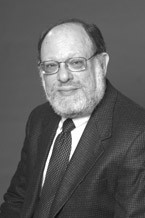
Provost candidate interviewed
Provost candidate Michael Mezey finished his two-day visit to the campus last Friday, but not before meeting with Student Senate and faculty members to ask and answer questions about his visions for SMU.
At 2 p.m. last Friday, Mezey met with 10 students, all of whom are active members of Student Senate. The meeting lasted about 40 minutes, in which both students and Mezey conversed to the last second in an effort to gain a better understanding of each other’s perspectives.
After briefly introducing himself, Mezey summed up his overall impression during his visit to SMU.
“I’ve just been so impressed by SMU and the quality of the faculty’s commitment to students,” Mezey said.
Mezey proposed several ways to improve SMU’s national recognition, namely through the development of existing programs. One point he continuously made was the need to build a strong undergraduate program. He shared three ways to effectively do just that.
First, he advised against pulling funds from undergraduate programs to fund new doctorate programs, proposing the idea of external fundraising for current progams.
“Don’t create doctoral programs from scratch, but build on existing programs,” Mezey said. “I believe SMU can become more prestigious without adding doctoral programs.”
Next, further development of the honor’s program, he said, would help distinguish honor students in the undergraduate program. He referred to co-curriculars as an example of the type of opportunites honor students could pursue in an urban city like Dallas, working with local businesses. In addition, restrictions on general education curriculum courses for honor students only would also further distinguish the program, he said.
“There’s a need to provide support for those types of students,” Mezey said.
In his final proposal, Mezey critiqued the general education curriculum. He said SMU has a strong science, English and cultural formations requirement, but there is a need for more emphasis in philosophy.
“GEC is very important to me,” Mezey said.
During Q&A, students asked Mezey to compare his experience at DePaul University to SMU.
Mezey pointed to three differences between the schools: diversity, location and mentality.
DePaul University, a private catholic university located in downtown Chicago, has a diverse student body make up, Mezey said. One third of the students are from Chicago, one third from Illinois and one third are from out of the state. He described many students as commuters and first generation college attendees.
In opening and concluding, Mezey reiterated his decision to pursue his candidacy for provost at SMU.
“I don’t typically respond to invitations like this,” Mezey said, explaining that he looks for a certain type of institution and SMU fit his criteria. At 3:30 p.m., Mezey addressed SMU faculty in a more formal question and answer session facilitated by Christine Buchanan.
In his opening, Mezey named three components of strengthening the faculty’s presence on campus. One, faculty who are scholars are likely to be better professors. Two, all faculty, no matter who they teach should have active scholarly work, such as research. And three, faculty scholarships should be increased to support community activities outside the classroom, such as field trips.
Ultimately he said the function of a provost is to take action.
“The role of a provost is to make certain there is cooperation, communication and collaboration,” Mezey said.
During the faculty Q&A, Mezey posed the idea of working closely with deans and chairs, in an effort to recognize and reward faculty members who head or advise student organizations on campus. His financial opinion was brought out when one faculty member pointed to DePaul University’s lack of a football program.
“I don’t view the athletic department as the highest priority at a university,” Mezey said in relation the university’s education funds. Another heated topic amongst faculty members was SMU’s current tenure policy. Mezey responded to SMU’s tenure policy, in summary, saying he is a supporter of tenure, but would not comment on SMU’s policy due to his unfamiliarity with it.
In conclusion, Mezey expressed his avid support for study abroad programs, both in sending students abroad and bringing foreign students to the university. Mezey currently presides as dean of the Liberal Arts and Sciences College at DePaul University in Chicago, Ill. He has worked there since 1995. Currently he is responsible for a college of 405 full-time faculty and 100 staff members, offering 31 undergraduate degree programs, 19 masters programs and two doctoral programs.
The university provost, also known as the chief academic officer, falls in line one below the university president. Typically, provost candidates have taught at a university for several years, distinguishing themselves in some way. A provost’s term usually lasts from five to ten years, from which they either chose to continue teaching at the university or seek out a more distinguished position. The provost’s responsibilities include: the hiring and firing of all faculty at the university, overseeing the university‘s general education curriculum and university fundraising, to name a few. Essentially, if the president steps out of the office, the provost takes control of the reigns for the time being.
When current Provost Ross Murphy announced the end of his term this school year, a search committee immediately went to work. Collectively, they chose four candidates, all of whom will have visited or will be visiting SMU in the next three weeks. Each candidate spends two days on campus meeting the president, vice presidents, deans, department chairs, the board of trustees and smaller groups of faculty and students. But it is within those two days, that a candidate makes his/her lasting impression. Once all four candidates have visited the university, the search committee reviews each candidate and makes a recommendation. Ultimately, President Turner decides which candidate to appoint. A decision will be reached by late February or early March. A new provost is expected to take office sometime this summer.
Tomorrow the second provost candidate, Associate Dean of the Faculty of the College of the Arts and Letters at Notre Dame Gregory Sterling, will be on campus.








